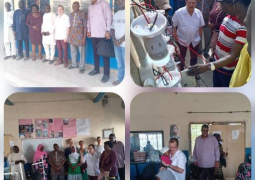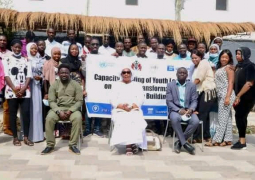
This call was echoed at the 4th NANHRI forum held at Sir Dawda Kairaba Jawara International Conference Centre in Bijilo under the theme: Integrating a Protect, Respect and Remedy Approach to Business and Human Rights in Africa, as a lever towards the Acceleration of Human, Social and Economic Capital Development.
The event was held on the margins of the ongoing 71st Ordinary Session of the African Commission on Human and People's Rights (ACHPR), from 21st April to 13th May 2022.
"While NHRIs and other human rights defenders (heads) have attempted to tackle business related rights violations and corruption, 'connections to powerful individuals in government have impeded monitoring and investigations for redress," said Gilbert Sebihogo, NANHRI executive director.
"Further, shrinking civic space and increased reprisals against heads in the sector of BHR have also hindered holding the violators accountable and ensuring justice to rights holders."
He added that, besides corruption, slow or no redress to business rights violations could be linked to lack of will and specific structure mechanisms.
"The African Charter on Human and People's Rights, in its preamble and various articles, calls on states to guarantee full enjoyment of economic, social, cultural, civil and political rights. Constitutions and other national legal provisions in most states complement the African Charter through specific frameworks of monitoring and redress to violations."
However, the NANHRI executive director pointed out that, it is regrettable that after 40 years of the African Charter, human rights situation has not been improved in Africa. "The worsening situation not only threatens the achievement of the Sustainable Development Goals of the United Nations- 8 years to their fulfilment- but also the African Union Agenda 2063."
"One of such frameworks is the African Policy on Business and Human Rights, which has stalled at the draft stage. We also note that only two countries in Africa- Kenya and Uganda- have developed national action plans on implementation of the UN Guiding Principle on Business and Human Rights through consultations with state and non-state actors," he further said.
"It is on this basis that NANHRI in collaboration with partners call on states in partnership with NHRIs to investigate, prosecute business entities violating human rights in the production chain, include extractive, processing, and service industries for accountability."
The network also called on the African Union through states to expedite and adopt a harmonised African Union Policy Framework on Business and Human Rights, adding that this would provide a binding legal basis requiring business entities to guarantee enjoyment of human rights in all aspects of their works.
The network also called on individual states to work with National Human Rights Institutions in developing National Action Plans (NAP) for the implementation of the UN Guiding Principles in Business and Human Rights and that states also set aside funds for the implementation of these NAPs.





